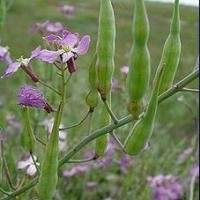Resistance evolution in weeds puts 2,4-D under the microscope

(Phys.org)—Researchers are investigating why a broadleaf herbicide used successfully to control weeds in agriculture for the past 60 years is now no longer effective against the crop weed, wild radish, in the Western Australian Wheatbelt.
The new research will work to identify how it is that the major WA crop weed, wild radish (Raphanus raphanistrum), can resist the most widely-used broadleaf herbicide in the world, 2,4-dichlorophenoxyacetic acid (2,4-D).
Winthrop Professor Stephen Powles, Director of the UWA-based Australian Herbicide Resistance Initiative (AHRI), is leading the Australian Research Council Linkage project with industry partner Nufarm.
"With the international release of the first genetically modified 2,4-D-herbicide resistant crops imminent in the US, it is vital that evolved 2,4-D resistance in weeds be clearly understood and, hopefully, minimised," Professor Powles said.
The research will unravel the biochemical and molecular basis of 2,4-D resistance in wild radish. The herbicide 2,4-D is very similar to auxin, a key plant growth hormone that is involved in all stages of the plant life cycle. Determining how wild radish becomes resistant to 2,4-D while retaining normal auxin activity poses a significant research challenge.
Studies will investigate plant 2,4-D uptake and movement, its effectiveness at sites of action within the plant, and the potential for resistant plants to detoxify 2,4-D.
The ultimate aim of the research is to provide the science that will enable the effective use of the auxin-type herbicides in agriculture.
Provided by University of Western Australia















